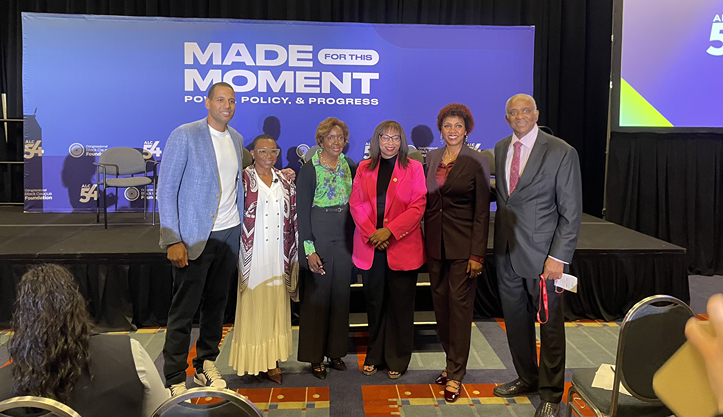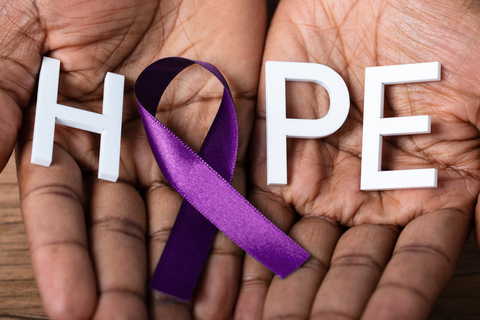- By Victor Mejia

At the Congressional Black Caucus Foundation’s Annual Legislative Conference (ALC54), a standing-room panel—“AI for All: Unlocking the Potential of AI in Healthcare for Black Communities”—took on a timely question: can artificial intelligence help close long-standing gaps in care, or will it hard-wire them deeper?
The conversation, moderated by Sandra Ajisafe (Healthcare Executive Director, Genentech), featured Rep. Janelle Bynum (US Congresswoman), Dr. Gary Puckrein, president and CEO of the National Minority Quality Forum (NMQF), Waves Mowatt-Kane (Director, Experience Design & Head of Human-Centered Design, Genentech), and Davidek Herron (Chief Digital Experience Officer, Genentech). What followed was equal parts sober history lesson, practical roadmap, and call to action.
The promise—and the risk—of AI in health
AI can help—if we do it right. It can spot illness earlier, speed up and sharpen diagnoses, translate care plans into plain language (and the patient’s language), and use remote check-ins so people don’t have to miss work or travel far. With most older adults now using smartphones, telehealth can finally bring specialists into “medical deserts.”
But AI is only as good as the data we feed it. As Dr. Gary Puckrein noted, today’s data gaps come from a two-tier health system born in segregation. Many high-risk neighborhoods—like Houston’s Fifth Ward, a known cancer cluster—have few clinical trials and little consistent data. If we don’t collect data there, what exactly are we training AI on? The fix is concrete: build care and data infrastructure in the highest-risk ZIP codes—clinics, broadband, labs, community partnerships—then use AI to spot early warning signs and intervene sooner.
Trust must be co-created, not declared
Rep. Bynum pressed for representation and ethics from the start—beginning in K-12 and continuing through the research pipeline, regulation, and boardrooms. “Who’s at the table shapes which questions get asked—and which don’t,” she said, tying education to agency and, ultimately, to generational wealth.
Davidek Herron underscored that trust is built by being present, transparent about gaps, and accountable for closing them. That includes working with communities rather than building tools for them. Examples like culturally tuned chatbots and community-guided product design only exist because residents co-authored the work.
Train AI to conserve life—not just costs
A recurring theme was the need to align algorithms with the purpose of healthcare. “Train AI to conserve life,” Dr. Puckrein said, warning that if systems optimize for financial risk—via automated denials, prior authorization, or step therapy—they will reproduce inequity at scale. The counterweight is intentional design: feed models with representative community data, measure them on outcomes that matter to patients, and make those metrics visible.
Policy, IP, and the science pipeline
The panel called for protecting NIH investments and safeguarding intellectual property so biomedical innovation benefits patients without repeating past harms. Rep. Bynum cited The Immortal Life of Henrietta Lacks as a reminder that ethics and equity are inseparable from science. She also cautioned against the current anti-science climate, which threatens to set research and education back just as AI’s clinical potential accelerates.
Community examples—and what’s next
NMQF described its collaboration in Houston’s Fifth Ward with Quest Diagnostics to collect blood, genomic, and EHR data so AI can flag cancer risk years earlier and guide targeted interventions—precisely the kind of “build with” model the panel urged. More broadly, NMQF maintains a 25-year longitudinal dataset—millions of patient records across 100,000+ conditions—that can help researchers and communities co-design solutions if partners commit to applying findings through policy and practice, not just publishing them.
The panel closed with practical empowerment: get curious and use the tools. If an AI summary is wrong or incomplete, challenge it; human feedback helps correct models. Document lived experience, push for minority clinicians and data scientists in every phase of development, and insist that access keeps pace with innovation so approvals and coverage don’t become the new chokepoints.
Bottom line
AI can be a lever for health equity—but only if it’s trained on representative data, governed by ethics, co-built with communities, and judged by whether it extends healthy, high-quality lives. That requires engineers and advocates, funders and policymakers, patients and clinicians, all pulling in the same direction.
ALC54’s message was clear: don’t build the future about Black communities; build it with Black communities—and measure success in lives conserved.
Trending Topics
Features
- Drive Toolkit
Download and distribute powerful vaccination QI resources for your community.
- Health Champions
Sign up now to support health equity and sustainable health outcomes in your community.
- Cancer Early Detection
MCED tests use a simple blood draw to screen for many kinds of cancer at once.
- PR
FYHN is a bridge connecting health information providers to BIPOC communities in a trusted environment.
- Medicare
Discover an honest look at our Medicare system.
- Alliance for Representative Clinical Trials
ARC was launched to create a network of community clinicians to diversify and bring clinical trials to communities of color and other communities that have been underrepresented.
- Reducing Patient Risk
The single most important purpose of our healthcare system is to reduce patient risk for an acute event.
- Jessica Wilson
- Jessica Wilson
- Subash Kafle

















